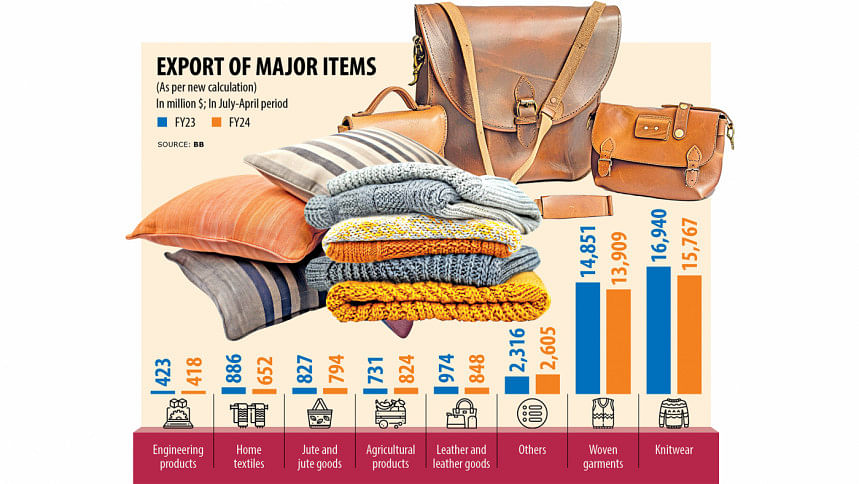Apprehensions rife over future exports

The ongoing unrest and curfew have raised apprehensions over Bangladesh's future exports on the back of data corrections by Bangladesh Bank showing that almost all major sectors suffered a drop in shipments last fiscal year.
The situation has been exacerbated by the fact that Bangladesh is in dire need of foreign currencies to prop up dwindling foreign exchange reserves, which have dropped to just $20.48 billion as of July 31 of this year.
Protests since July 15 over reforming public job quotas led to the deaths of at least 204 people and massive destruction of government property.
The authorities imposed a curfew on July 20 to contain the situation. Public and private offices are running under relaxed curfew times and economic activities are yet to return to normal.
Among the products, knitwear exports, which account for over a third of the country's total export earnings, declined 6.93 percent
The central bank found the export data mismatch in reports prepared by the Export Promotion Bureau (EPB) and the National Board of Revenue (NBR) for the July-April period of fiscal 2023-24.
The actual exports amounted to $33.67 billion, nearly $14 billion below the value earlier published, representing a 6.8 percent year-on-year fall in exports.
Among the products, knitwear exports, which account for over a third of the country's total export earnings, declined 6.93 percent.
Similarly, export of woven garments, which account for a similar portion of the total shipments, declined 6.34 percent.
The scenario was the same for all the sectors, except for agricultural products, plastic and chemicals.
"The buyers are in uncertainty and anxious over the unrest and on whether the exporters will be able to deliver the products,'' said Mohammad Hatem, executive president of the Bangladesh Knitwear Manufacturers and Exporters Association.
The apparel sector faced direct losses of $800 million as exporters had to offer discounts and bear port demurrages for missing lead times and shipment deadlines, he told The Daily Star.
Besides, Bangladesh missed out on receiving exports orders amounting to at least $3 billion during the last 12 days as those were not placed for the unrest, he said.
Hatem feared that those orders were placed in countries comparatively similar to Bangladesh.
Fortunately, previous work orders were not cancelled and the buyers are now observing the situation to decide on their next steps, he said.
Till date the mood of the buyers is not clear, said Anwar-Ul-Alam Chowdhury, president of the Bangladesh Chamber of Industries, adding, "So, it's tough to forecast what is ahead."
It is tough to understand the buyers and what they are thinking regarding the ongoing situation of the country, he said.
As S&P Global downgraded Bangladesh's long-term sovereign rating from BB- to B+, its impact will fall on the economy as well as exports, he said.
Considering the overall situation, there is a possibility that there will be a negative impact at the end of the day as buyers do not like unrest and an unstable situation, said Chowdhury.
Referring to a latest US study, he said American fashion companies were actively diversifying their apparel sourcing base and exploring opportunities, especially in India, amid growing risks and market uncertainties in Bangladesh. This is not a good message for the Bangladeshi exporters, he said.
The recent unrest pushed the country's economy and exports towards uncertainty, said Ahsan Khan Chowdhury, chairman and chief executive officer of PRAN-RFL Group.
Some of their buyers have cancelled scheduled factory visits, he said.
Businesses should be provided the space to function for the sake of the economy and, overall, national interest, he said.
Businesses have an equilibrium and if it collapses for any reason, it takes time to return to normalcy, said Khan, adding, "Now it will take time for normalcy to return to Bangladesh."
"Exports of our sector, particularly agricultural products, were in the positive last fiscal year and it will continue this fiscal year also as we have plans to grow the exports," he said.
He claimed that their agriculture products were doing well in the international markets and gaining popularity.
"If we get sufficient investment from the financiers, our business will definitely grow," he said, adding, "We do not need to stay stuck in flashbacks of the past, rather we should think about the future."
"Besides, we entered the plastic sector which is also creating a scope to win over the global market and it has good prospects to grow the exports," he said.
Exports of fiscal year 2024-25 are off to a rocky start as the first month saw the loss of operations for a number of days, said Ashraf Ahmed, president of the Dhaka Chamber of Commerce and Industry.
If exports are taken to be of $50 billion over 365 days, loss in export earnings over 10 days stands at nearly 2.7 percent or $1.3 billion or Tk 16,200 crore.
On top of that, there is a loss of confidence of buyers overseas, which remains unquantifiable, he said, adding, "Risk discounts can climb higher, while borrowing costs will increase, creating pressure on prices.''
"Hopefully, the figure will be lower as we will be able to complete some exports with some delays and recover some of the lost production days by working harder later in the year," he said.

 For all latest news, follow The Daily Star's Google News channel.
For all latest news, follow The Daily Star's Google News channel. 



Comments